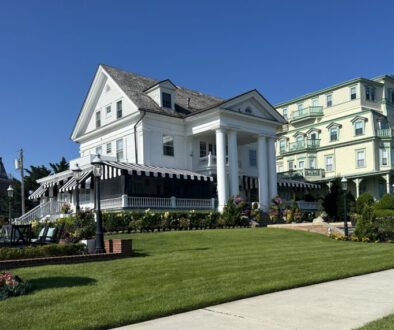Fueling Local Futures
Atlantic Cape Community College’s local campus is an unsung resource for people looking to get started and get ahead, in life and work

Why community college?
In light of the student loan crisis that has saddled millions of Americans with more than $1.6 trillion in debt, a timelier question may be: Why not community college?
By design, community colleges, sometimes known as junior colleges, are more convenient and accessible, with open enrollment and flexible scheduling. For some, they provide a springboard to higher education. For others, they offer vocational training that can lead to a new or better job. And in lean economic times, community colleges are also more affordable—by far.
In 2021-22, the average cost per credit hour for four-year educational institutions was $575. Currently at Atlantic Cape Community College, the rate is $141.60, less than $425 for a three-credit course.
The state’s Community College Opportunity Grant reduces the burden even more, picking up the tab for students in households earning $65,000 per year or less. (Tuition costs also can be reduced for people from households that generate up to $100,000 per year.)
The mantra is “higher education, not higher debt,” according to David Zuba, public relations manager for ACCC, with campuses in Mays Landing, Atlantic City, and Cape May Court House.
Growth industries, high-paying jobs
Affordability and convenience matter, but education is paramount. ACCC’s credit courses apply to more than 40 academic programs and nine degree tracks. General studies and business are in demand, says Cape May County campus director Krista McConnell. But healthcare tops the list.
According to the U.S. Bureau of Labor Statistics, through 2032 employment in healthcare is projected to grow more quickly than in any field, as current workers retire and the elderly population surges. “We have an aging population here in Cape May County,” second only to Ocean County in the state, says McConnell. “We need nurses, we need doctors.”
ACCC trains students for careers in nursing, radiology, respiratory therapy, and health information specialties. A new partnership with Thomas Jefferson University Hospital enables students to earn LPN or RN degrees locally, then move on to Jeff for a BSN.
Recent graduate Jessica Wright of North Cape May intended to become a registered nurse and follow in her mother’s footsteps. That plan didn’t work out.
“I liked science, but it didn’t like me,” Wright jokes. So, she pursued radiology. After graduating in May, she joined the staff at an Atlantic County hospital, and from there, will explore advanced modalities. “With an x-ray license I can specialize in CAT (imaging), MRI, nuclear medicine—I’m figuring out what path that is, my short-term and long-term goals.”
Hailie Nyugen of Egg Harbor Township started in health science at ACCC, then switched to healthcare administration. She’s now an intern at AtlantiCare, working in the human resources department.
Nyugen thanks advisers and professors for helping her recognize her potential. “I was so introverted in high school,” she says. “They helped me get out of my shell and know I leaned toward a leadership position.”
No limits
Among foodies, ACCC may be best known for its Academy of Culinary Arts, which has produced chefs of national renown. One well-known alumna is Deb Pellegrino, executive director chef at Borgata Hotel Casino & Spa, the first woman appointed top chef in an Atlantic City casino.
In 2011, Pellegrino competed against other pastry chefs in the Food Network Challenge. She took home the grand prize of $10,000 in the “Chocolate Myths” category, for her exotic “Kraken cake.”
More recently, Cole Perfetti of Marmora, a 2023 ACA graduate and class valedictorian, opened Surf Road Coffee Bar and Beach Bowls in Smithville. At the June ribbon-cutting, he thanked “all of the amazing chefs I learned from” at the academy.




South Jersey is also a growing aviation hub, thanks to Atlantic City International Airport, the FAA Hughes Technical Center, and the upcoming Aerospace Innovation Center, an $18.5 billion research and technology park coming to Egg Harbor Township in early 2026.
ACCC’s aviation sciences track is equipping the next generation of airport personnel, from those in the cockpit to managers and business administrators on the ground. Future pilots and air traffic controllers can train on the college’s own flight simulator, which displays traffic at any airport in the country across multiple screens.
Another emerging program, funded by a grant from the National Science Foundation, trains drone pilots, technicians, and mechanics. And the college also teaches up-to-the-minute technologies like esports, game design, cybersecurity, and computer systems support.
Back to school
Community colleges are known for attracting nontraditional students: working adults, people over 25, and anyone who needs extra training to get ahead.
“Say you have a background in photography, and want to learn more about the digital aspect,” says Zuba. “Here, you can get a 30-credit certificate that gets you in, out, and into the workplace.”
ACCC also welcomes so-called “stop-outs,” people who previously attended college, but left without a degree. The college makes it easier for working students with remote, in-person, online, and hybrid learning options. Importantly in a resort area, its schedules accommodate those in the hospitality industry, who are busiest during the tourist season. The fall semester starts after Labor Day.
Some students enroll with no degree track in mind and discover their path along the way. Charlene Maycott first started college in the 1980s, then quit to help care for her aging grandmother. She didn’t go back to school until 2019, when she enrolled at ACCC in her mid-50s.
“I just wanted to experience going to college,” she says. “I never had a dream of getting a degree.”
Then she hesitated. Worried about being in the classroom with young adults, and stymied by the enrollment process, she almost quit before she started. Then Jean McAlister, chief advancement officer, intervened.
“She was my angel,” says Maycott. “She said, ‘Listen, you can do this, and you’re going to love it.’” Maycott now holds associate degrees in communications and psychology and is close to completing a degree in advanced and continuous studies. She plans to transfer to Stockton University for her baccalaureate. The former Atlantic City casino host has her eye on a public relations career.
She has also forged lasting friendships among her younger classmates. “College-age kids don’t shun you or make fun of you,” she says. “We both learned from each other.”


How to succeed in business
Enrollment at community colleges soared after the Great Recession of 2008-09, as jobless Americans retrained for new careers. But when the job market recovered, enrollment declined, and the drop-off accelerated during the Covid-19 pandemic.
Though they are now seeing a slight rebound, like all businesses, community colleges are learning to adapt, pivot, and reframe their missions to stay relevant. It starts with listening to the people they serve, says McConnell.
“We’re all trying to figure out what our students want: is it short-term certificates, help toward a four-year degree? Community colleges are not just about two-year college degrees. We’re about workforce development. We’re about personal interest. We are community assets. And we do need to appeal to all.”
To that end, the Cape May County campus continues to expand. Last year, it launched the county BizHub, where would-be or current business owners can brush up on fundamentals, like accounting, tax planning, and marketing, and get more tailored support depending on their goals.
“It’s a one-stop shop,” says director Christopher Stenger. “We’ve had mechanics looking to get into mobile marine services. We’ve had restaurants trying to figure out funding options. We’ve had other businesses looking for grant opportunities. We just helped a Montessori school apply for a loan for a permanent location.”
The BizHub—which has attracted entrepreneurs as young as 15 and as old as 93—also offers seminars, networking opportunities, professional mentoring, and other resources. All are free for county residents.
Another new addition is the $1.2 million Dr. Alex Ernst Memorial Education Center, home of the college’s Zoo Education Program. Created in partnership with the Cape May County Zoo, it was named for the beloved zoo veterinarian, who passed away in December at age 45.
For kids, the Ernst Center offers zoo camps, a Zoo to You program, animal encounters, and guided tours. This summer, the BizHub got involved too, with “Shark Tank Week,” to teach youngsters the rudiments of running a business.
“They had to come up with the idea, figure out how to fund the business, and decide how many employees they needed—they were so into it,” says McConnell. “It was cool to see some of the ideas they had. It brought a tear to my eye, just to see them so excited about starting their small business.”
Meanwhile, the college is considering ways to create a veterinary education center for adults at the same facility.
Keeping pace with the times
The community college model was first established in the early 20th century to make higher education available to more Americans. In a 2015 article in Time magazine, Penn State University Professor Sean Trainor called two-year colleges “problem-solvers” that confronted a swiftly evolving economy and workforce.
They worked by filling a previously unmet need, offering “adult education and workforce retraining,” and welcoming “everyone from curious retirees eager to learn a new skill, to victims of mid-career layoffs in need of a new skill set.”
Charlene Maycott says she could never have afforded a college education without the financial leg-up provided by the state and ACCC. “This is the perfect way to do it, especially if you don’t have a lot of money. I loved it, and if I had to do it over again, I would do it the exact same way.”
That’s truer today than perhaps any time in recent memory. Yet there is a stubborn perception that education at the community college level is somehow less real or less valuable than that at a four-year college.
“I hate it when people downplay community college,” says Hailie Nyugen. She calls her time at ACCC “the best years of my life. Atlantic Cape does a really great job of celebrating students’ small wins. It helps people who are juggling full-time work, classes, and homelife. And it gives you a great education.”
McConnell adds, “A degree or an upskilling certificate or any coursework done at a community college is no less valuable than anywhere else. We have caring instructors who are going to give you what you need to move forward in life.
“But number one, hands-down, it’s the absolutely most affordable option, right here in your backyard. Why would you drive past it?”



